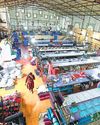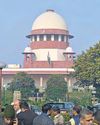
Has there ever been a grimmer backdrop to the world's most concerted attempt to avert global warming? COP29, the annual conference for the United Nations Framework Convention on Climate Change, is happening in Baku, Azerbaijan, one of the birthplaces of the modern oil industry and (according to civil liberties group Freedom House) among the most oppressive societies on the planet.
Leaders from China and the US, which account for about 45% of the world's carbon footprint, aren't attending—and US President Joe Biden is a 'lame duck' after the Republican Party's electoral sweep. Almost every other major economy in Asia and the Americas will be absent, thanks to an Asia-Pacific Economic Cooperation summit in Peru this week, while the leaders of Germany, France and the EC are also staying home.
There have been other tough summits. COP28 in Abu Dhabi foreshadowed this year's event by resembling a trade fair for the oil industry. Still, it happened before the anti-climate wave seen in recent European and US elections. The 2009 event in Copenhagen collapsed in disarray, but 15 years ago the world had more wiggle room to avoid disaster. About a quarter of all emissions since 1850 have happened since Copenhagen. We've only got 7 years left of current-rate pollution to retain an even chance of keeping global warming below 1.5° Celsius.
This story is from the {{IssueName}} edition of {{MagazineName}}.
Start your 7-day Magzter GOLD free trial to access thousands of curated premium stories, and 9,000+ magazines and newspapers.
Already a subscriber ? Sign In
This story is from the {{IssueName}} edition of {{MagazineName}}.
Start your 7-day Magzter GOLD free trial to access thousands of curated premium stories, and 9,000+ magazines and newspapers.
Already a subscriber? Sign In

What's the personal style of stylists? COURTESY INST
Stylists dress their celebrity clients to trend but when it comes to dressing themselves, they are 'very mindful, very me'

Tennis in 2025 A season of unrest and high drama
The sport is grappling with doping scandals anda power vacuum following the decline of the Big Three. Meanwhile, a new generation of stars, led by Jannik Sinner, Carlos Alcaraz, and Aryna Sabalenka, are poised to take centre stage

AI chip curbs trigger rare public fight: Tech giants vs China hawks
Tension between national security hawks and the biggest American technology companies over China policy has burst out into the open.
Global occupiers drive India office demand boom
India's commercial real estate rocketed last year, primarily on the back of swelling demand from global firms scouring the country for office spaces, according to reports by top property consultants.

Infy says top exec stalled suite before joining Cognizant
Infosys Ltd has alleged that its former executive S Ravi Kumar deliberately delayed the rollout of its product rival-ling Cognizant Technology Solutions Corp's healthcare software as he was in talks to join as the chief executive of the Nasdaq-listed firm.

Advent of new angels spurs rush of bite-sized cheques
Investments of as little as ₹50,000 are surging in India's expanding startup ecosystem as the fear of missing out and easier access to deals spur a new wave of angel investing.

Govt Plans New Clusters to Fire Up Manufacturing
Tax sops, roadmap to build factories along infrastructure projects likely in budget
Adani sells ₹4,850-cr Adani Wilmar shares
The transaction saw massive demand from a diverse set of marquee international and domestic investors

SC Stays Tax Notices of ₹1.5 tn to E-gaming Cos
The gaming companies and the revenue department both sought the stay

India to be testbed for green technology
The Global Energy Alliance for People and Planet (GEAPP) plans to use India as a testbed for new decarbonization technologies that would then be commercially operationalized in other developing countries.